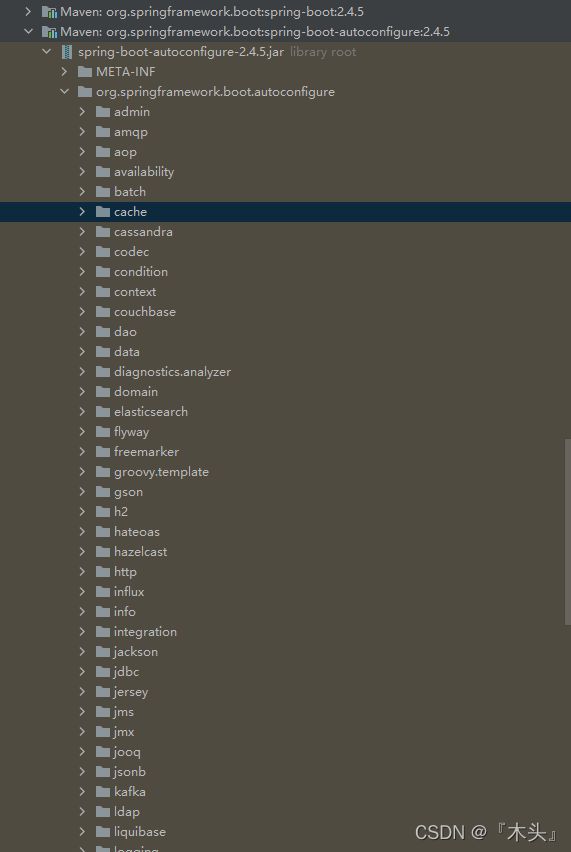SpringBoot --- 缓存Cache/Redis
SpringBoot --- 缓存Cache
-
- 1.依赖
- 2.application.properties
- 3.注解
- 4.代码
整理不易,不喜勿喷。谢谢
SpringBoot — 整合Ldap.
SpringBoot — 整合Spring Data JPA.
SpringBoot — 整合Elasticsearch.
SpringBoot — 整合spring-data-jpa和spring-data-elasticsearch.
SpringBoot — 整合thymeleaf.
SpringBoot — 注入第三方jar包.
SpringBoot — 整合Redis.
Springboot — 整合slf4j打印日志.
Springboot — 整合定时任务,自动执行方法.
Springboot — 配置多数据源,使用JdbcTemplate以及NamedParameterJdbcTemplate.
Sprignboot — 详解pom.xml中build和profile.
SpringBoot — 监控.
SpringBoot — 缓存Cache/Redis.
SpringBoot与Zookeeper.
Git的使用.
有时间多研究一下这个包,spring-boot-autoconfigure
1.依赖
org.springframework.boot
spring-boot-starter-cache
org.springframework.boot
spring-boot-starter-data-redis
2.application.properties
spring.cache.type= #缓存的技术类型,可选 generic,ehcache,hazelcast,infinispan,jcache,redis,guava,simple,none
spring.cache.cache-names=user,menu
spring.cache.redis.time-to-live=600000
spring.cache.redis.key-prefix=com.cache
spring.redis.host=127.0.0.1
spring.redis.port=6379
spring.redis.password=Redis!123
spring.redis.jedis.pool.max-active=8
spring.redis.jedis.pool.max-wait=-1ms
spring.redis.jedis.pool.max-idle=500
spring.redis.jedis.pool.min-idle=0
spring.redis.lettuce.shutdown-timeout=0ms
| 选项 | 作用 |
|---|---|
| Simple | 基于ConcurrentHashMap实现的缓存,适合单体或者开发环境 |
| none | 关闭缓存, |
| redis | 使用Redis作为缓存, |
| Generic | 用户自定义缓存实现,实现org.springframework.cache.CacheManager |
3.注解
@Cacheable
- value、cacheNames:两个等同的参数(cacheNames为Spring 4新增,作为value的别名),用于指定缓存存储的集合名。由于Spring 4中新增了@CacheConfig,因此在Spring 3中原本必须有的value属性,也成为非必需项了
- key:缓存对象存储在Map集合中的key值,非必需,缺省按照函数的所有参数组合作为key值,若自己配置需使用SpEL表达式,比如:@Cacheable(key = “#p0”):使用函数第一个参数作为缓存的key值
- condition:缓存对象的条件,非必需,也需使用SpEL表达式,只有满足表达式条件的内容才会被缓存,比如:@Cacheable(key = “#p0”, condition = “#p0.length() < 3”),表示只有当第一个参数的长度小于3的时候才会被缓存
- unless:另外一个缓存条件参数,非必需,需使用SpEL表达式。它不同于condition参数的地方在于它的判断时机,该条件是在函数被调用之后才做判断的,所以它可以通过对result进行判断。
- keyGenerator:用于指定key生成器,非必需。若需要指定一个自定义的key生成器,我们需要去实现org.springframework.cache.interceptor.KeyGenerator接口,并使用该参数来指定。需要注意的是:该参数与key是互斥的
- cacheManager:用于指定使用哪个缓存管理器,非必需。只有当有多个时才需要使用
- cacheResolver:用于指定使用那个缓存解析器,非必需。需通过org.springframework.cache.interceptor.CacheResolver接口来实现自己的缓存解析器,并用该参数指定
public class BookServiceImpl implements BookService {
@Cacheable("books")
public Book findBook(ISBN isbn) {...}
@Cacheable({"books", "users"})
public Book findBook(ISBN isbn) {...}
@Cacheable(cacheNames="books", key="#isbn")
public Book findBook(ISBN isbn, boolean checkWarehouse, boolean includeUsed)
@Cacheable(cacheNames="books", key="#isbn.rawNumber")
public Book findBook(ISBN isbn, boolean checkWarehouse, boolean includeUsed)
@Cacheable(cacheNames="books", key="T(someType).hash(#isbn)")
public Book findBook(ISBN isbn, boolean checkWarehouse, boolean includeUsed)
@Cacheable(cacheNames="book", condition="#name.length() < 32")
public Book findBook(String name)
@Cacheable(cacheNames="book", condition="#name.length() < 32", unless="#result.hardback")
public Book findBook(String name)
.....
}
@CachePut
- 主要针对方法配置,能够根据方法的请求参数对其结果进行缓存,和 @Cacheable 不同的是,它每次都会触发真实方法的调用 。简单来说就是用户更新缓存数据。但需要注意的是该注解的value 和 key 必须与要更新的缓存相同,也就是与@Cacheable 相同。
public class BookServiceImpl implements BookService {
@CachePut(cacheNames="book", key="#isbn")
public Book updateBook(ISBN isbn, BookDescriptor descriptor)
}
@CacheEvict配置于函数上,通常用在删除方法上,用来从缓存中移除相应数据。
- allEntries:非必需,默认为false。当为true时,会移除所有数据。如:@CachEvict(value=”testcache”,allEntries=true)
- beforeInvocation:非必需,默认为false,会在调用方法之后移除数据。当为true时,会在调用方法之前移除数据。 如:@CachEvict(value=”testcache”,beforeInvocation=true)
public class BookServiceImpl implements BookService {
@CacheEvict(cacheNames="books")
public void loadBooks(InputStream batch)
//对cacheNames进行批量删除
@CacheEvict(cacheNames="books", allEntries=true)
public void loadBooks(InputStream batch)
}
@Caching 可以混合各种注解
public class BookServiceImpl implements BookService {
@Caching(evict = { @CacheEvict("primary"), @CacheEvict(cacheNames="secondary", key="#p0") })
public Book importBooks(String deposit, Date date)
}
@CacheConfig统一配置本类的缓存注解的属性,在类上面统一定义缓存的名字,方法上面就不用标注了,当标记在一个类上时则表示该类所有的方法都是支持缓存的
@CacheConfig("books")
public class BookServiceImpl implements BookService {
@Cacheable
public Book findBook(ISBN isbn) {...}
}
}
4.代码
1.开启缓存
@SpringBootApplication
@EnableCaching //开启缓存
public class DemoApplication{
public static void main(String[] args) {
SpringApplication.run(DemoApplication.class, args);
}
}
2.查看源码
package org.springframework.boot.autoconfigure.cache;
import java.util.LinkedHashSet;
import java.util.List;
import org.springframework.beans.factory.ObjectProvider;
import org.springframework.boot.autoconfigure.AutoConfigureAfter;
import org.springframework.boot.autoconfigure.cache.CacheProperties.Redis;
import org.springframework.boot.autoconfigure.condition.ConditionalOnBean;
import org.springframework.boot.autoconfigure.condition.ConditionalOnClass;
import org.springframework.boot.autoconfigure.condition.ConditionalOnMissingBean;
import org.springframework.boot.autoconfigure.data.redis.RedisAutoConfiguration;
import org.springframework.cache.CacheManager;
import org.springframework.context.annotation.Bean;
import org.springframework.context.annotation.Conditional;
import org.springframework.context.annotation.Configuration;
import org.springframework.core.io.ResourceLoader;
import org.springframework.data.redis.cache.RedisCacheManager;
import org.springframework.data.redis.cache.RedisCacheManager.RedisCacheManagerBuilder;
import org.springframework.data.redis.connection.RedisConnectionFactory;
import org.springframework.data.redis.serializer.JdkSerializationRedisSerializer;
import org.springframework.data.redis.serializer.RedisSerializationContext.SerializationPair;
/**
* Redis cache configuration.
*
* @author Stephane Nicoll
* @author Mark Paluch
* @author Ryon Day
*/
@Configuration(proxyBeanMethods = false)
@ConditionalOnClass(RedisConnectionFactory.class)
@AutoConfigureAfter(RedisAutoConfiguration.class)
@ConditionalOnBean(RedisConnectionFactory.class)
@ConditionalOnMissingBean(CacheManager.class)
@Conditional(CacheCondition.class)
class RedisCacheConfiguration {
@Bean
RedisCacheManager cacheManager(CacheProperties cacheProperties, CacheManagerCustomizers cacheManagerCustomizers,
ObjectProvider<org.springframework.data.redis.cache.RedisCacheConfiguration> redisCacheConfiguration,
ObjectProvider<RedisCacheManagerBuilderCustomizer> redisCacheManagerBuilderCustomizers,
RedisConnectionFactory redisConnectionFactory, ResourceLoader resourceLoader) {
RedisCacheManagerBuilder builder = RedisCacheManager.builder(redisConnectionFactory).cacheDefaults(
determineConfiguration(cacheProperties, redisCacheConfiguration, resourceLoader.getClassLoader()));
List<String> cacheNames = cacheProperties.getCacheNames();
if (!cacheNames.isEmpty()) {
builder.initialCacheNames(new LinkedHashSet<>(cacheNames));
}
if (cacheProperties.getRedis().isEnableStatistics()) {
builder.enableStatistics();
}
redisCacheManagerBuilderCustomizers.orderedStream().forEach((customizer) -> customizer.customize(builder));
return cacheManagerCustomizers.customize(builder.build());
}
private org.springframework.data.redis.cache.RedisCacheConfiguration determineConfiguration(
CacheProperties cacheProperties,
ObjectProvider<org.springframework.data.redis.cache.RedisCacheConfiguration> redisCacheConfiguration,
ClassLoader classLoader) {
return redisCacheConfiguration.getIfAvailable(() -> createConfiguration(cacheProperties, classLoader));
}
private org.springframework.data.redis.cache.RedisCacheConfiguration createConfiguration(
CacheProperties cacheProperties, ClassLoader classLoader) {
Redis redisProperties = cacheProperties.getRedis();
org.springframework.data.redis.cache.RedisCacheConfiguration config = org.springframework.data.redis.cache.RedisCacheConfiguration
.defaultCacheConfig();
config = config.serializeValuesWith(
SerializationPair.fromSerializer(new JdkSerializationRedisSerializer(classLoader)));
if (redisProperties.getTimeToLive() != null) {
config = config.entryTtl(redisProperties.getTimeToLive());
}
if (redisProperties.getKeyPrefix() != null) {
config = config.prefixCacheNameWith(redisProperties.getKeyPrefix());
}
if (!redisProperties.isCacheNullValues()) {
config = config.disableCachingNullValues();
}
if (!redisProperties.isUseKeyPrefix()) {
config = config.disableKeyPrefix();
}
return config;
}
}
